- By Dan Veaner
- Business & Technology
 Print
Print 
It's a circle of life. Talented but displaced people get an outlet to sell their beautiful clothing, people of means get a high quality, unique product, and children in need get to eat. That is the 'value chain' Riad Shalaby is creating that he hopes will turn into a sustainable business that helps people at every step along the way, even beyond the sale. True to its mission The Florida Cotton Company is partnering with the Food Bank of the Southern Tier, providing food for one backpack for each online sale the company makes.
"I think that would have meant something to my grandparents and great grandparents," Shalaby says. "I think they would find the value in that and they would think that what they did here was helpful. The other side of it is, pragmatically in today's world it's good business to help people. To try to do something with an association that's beyond the transaction that you're making. To embed that in the balance sheet of your business, you're going to create an environment where every time there is a revenue occurrence is something good for you, you're going to automatically build in some way to share that."
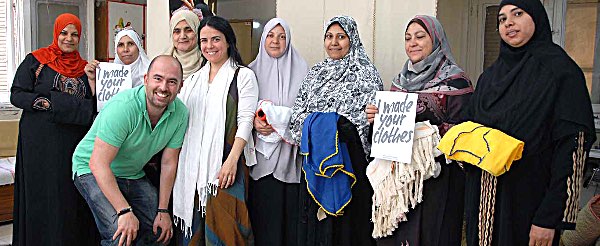 Economically challenged Egyptian women create the fabrics and clothes according to traditional designs that have persevered for centuries. Photo courtesy of Florida Cotton Co.
Economically challenged Egyptian women create the fabrics and clothes according to traditional designs that have persevered for centuries. Photo courtesy of Florida Cotton Co.The company is based in Lansing and Florida, but if all goes according to plan it will be part of many communities. The fabrics and clothes are made by women in Egypt who have been displaced by events in the Middle East. He started with Egyptian products because he has contacts there through his sister, who lives in Cairo and Alexandria. But eventually he plans to branch out to find other products from the region.
"We're buying them in their original designs and we're not doing anything to them," he says. "And they're beautiful. People have been wearing these clothes for hundreds or thousands of years. We import them here and distribute them on our Web site. We're going to sell these clothes in their original state to people that have the means and the interest to buy them. Once we do that we're going to take a percentage of that and help hungry kids."
While the focus of the company is in online sales, Shalaby realized that even though a significantly high percentage of women's apparel is purchased on line, 30% to 35% of the apparel that is bought online is returned because customers don't get to feel the fabric, see it in person, or try on the clothes before purchasing. A general contractor friend helped him build a tiny house -- actually a tiny shop.
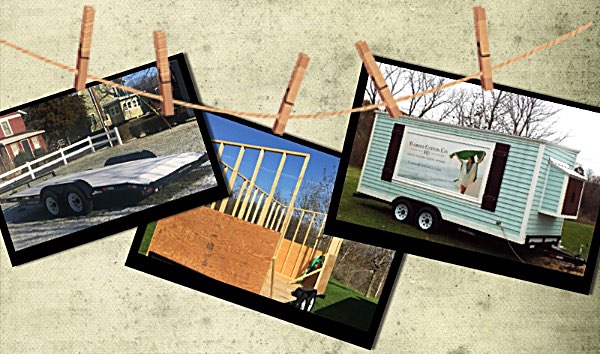 Starting with a car trailer, Riad Shalaby and a friend built an elegant shop on wheels. Photos (left and center) courtesy of Florida Cotton Co.
Starting with a car trailer, Riad Shalaby and a friend built an elegant shop on wheels. Photos (left and center) courtesy of Florida Cotton Co.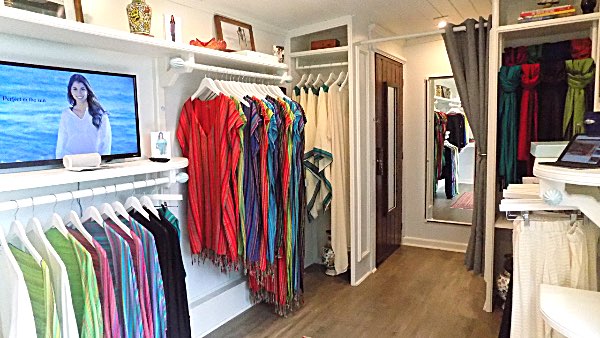 The interior of the tiny shop has plenty of product, attractively displayed. A presentation on a flat screen TV tells the story of the clothes and the company, and there are even changing rooms where customers can try the garments on.
The interior of the tiny shop has plenty of product, attractively displayed. A presentation on a flat screen TV tells the story of the clothes and the company, and there are even changing rooms where customers can try the garments on.The base of the shop is an 18 foot long car trailer he purchased in Brooktondale. Much of the fabrication of the shop was done in the garage of his mother's house, and before long a small, mobile retail shop had taken shape in his side yard. The outside features photographs of Cuban models of middle eastern heritage wearing the clothes. The pictures were taken in Miami. The models are also featured in a presentation inside the shop that runs continuously to tell the story of the company, the products, and the women who make them.
The store was completed in October. Its first outing was to a fashion show at Jane Morgan's Little House in Aurora, which carries his products. Next stop is Horseheads on December 2nd for the Selfless Elf Food bank 5K Run. In the first quarter of 2018 the shop will travel down the eastern seaboard. The goal of that trip is to find new partners both for selling the product line and for distributing contributions to feed hungry children.
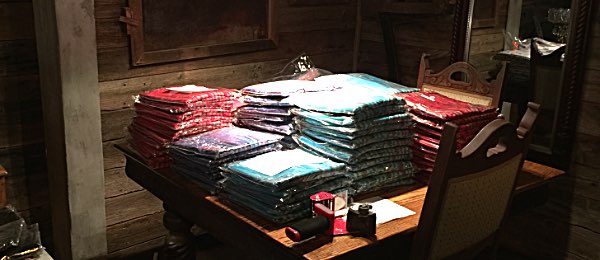 The basement of his mother's house on Myers Heights is a 'secondary warehouse' for online sales and the tiny shop
The basement of his mother's house on Myers Heights is a 'secondary warehouse' for online sales and the tiny shopFeeding hungry children is not just a concept to Shalaby. It is part of his family's history, and he views the older generations of his family as heroes.
"These people came here in 1900 and there were persecuted and hungry children," he says. "They came here and raised their families here. In the case of my uncle John he would be allowed to become an American citizen if he went to World War I. These people were important in my life. They were really extraordinary people, and people like them were extraordinary. They came to this country and they were ordinary folks, and lived ordinary lives, but they did extraordinary things. They went to work every day. They took care of their families. They were happy to be here in this country. They served in the military. They sent their kids to serve in the military."
His family came to Lansing to work at the International Salt Company (not to be confused with the Cayuga Salt Mine that produces road salt), which produced table salt from 1891 through 1962 on what is now known as Salt Point. A small bay accommodated barges from the Erie Canal system, which carried the salt away to market. Syrian immigrants built houses on the bluff above the factory and the company erected St. George's Syrian Orthodox Church, which continues to be maintained by the original families to this day and holds services each Sunday.
"My maternal great grandparents lived one in the green house, one in the blue house," he says, pointing to homes along Myers Heights Road and Abraham Lane. "My grandmother and grandfather met and were married in the church here. They moved here to work at the salt company and moved into this house in 1932. This is the house that they raised my Mom and her brothers and sisters in. Food was always very important to them, because when they were kids they didn't have much of it. That's the tie-in."
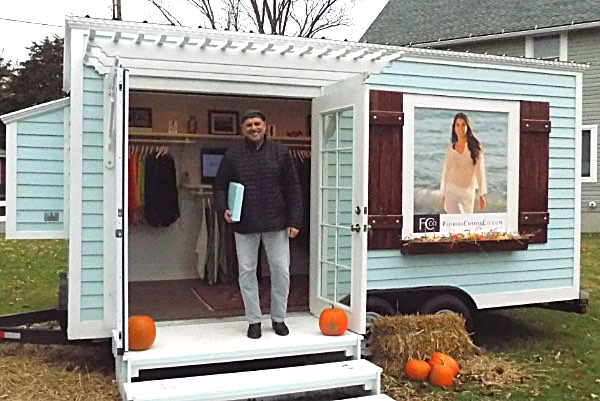 Riad Shalaby at the entrance of the Florida Cotton Company tiny store
Riad Shalaby at the entrance of the Florida Cotton Company tiny storeShalaby left home to seek his fortune, and was gone for 25 years. He returned to Syrian Hill two years ago to take care of his mother. Thinking about his Lansing family history, he felt his grandparents would approve of the idea that the fruits of his business should go to feed hungry children. On November 17th he announced the company would partner with the Food Bank of the Southern Tier's Backpack program, which sends food home over the weekend in the backpacks of children in need. The company donates the cost to fill one child’s backpack with food for every online sale. The fledgling company has already donated 100 backpacks-worth.
"I reached out to the Southern Tier Food Bank and was astonished at the quality of their organization," he says. "They have a 65,000 square foot facility in Elmira, and they were Food bank of the Year, a national enterprise with over 200 food banks. I've visited several of them. This is incredibly well run and well organized, a group of people who are dedicated. So it was easy for me to say I'm going to start here."
By 'start here' he means that as he makes sales in various communities he plans to identify similar programs that feed children in need in the locations where those sales are made. When he takes the shop on the road he hopes find new business partners and partners his sales can support in feeding needy children all the way from Myers Heights to Key West, Florida. It is starting on a small scale, but has the potential to become something much bigger.
"The products are cool and compelling and beautiful," he says. "The clothes are beautiful, the site's beautiful, and the result of that can be something that's good. I don't know if this is a hobby or a vocation, but I know it's been a heck of a lot of fun. I got a big kick out of traveling and meeting people, and what I found is we have more in common than we have differences. I've been blessed because of my grandparents and great grandparents. I've done a lot of interesting things and traveled to a lot of places, and did reasonably well. But I didn't really do very much that I think my grandparents and great grandparents would be proud of. So I want to do something with the next 25 years of my life that might mean something to the people that meant so much to me."
v13i46




